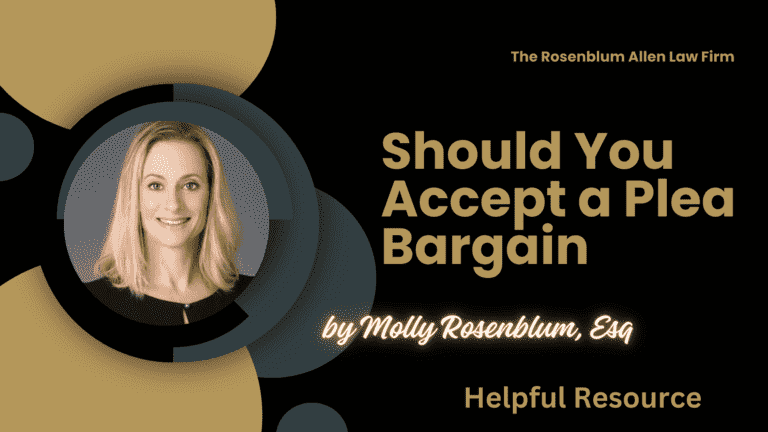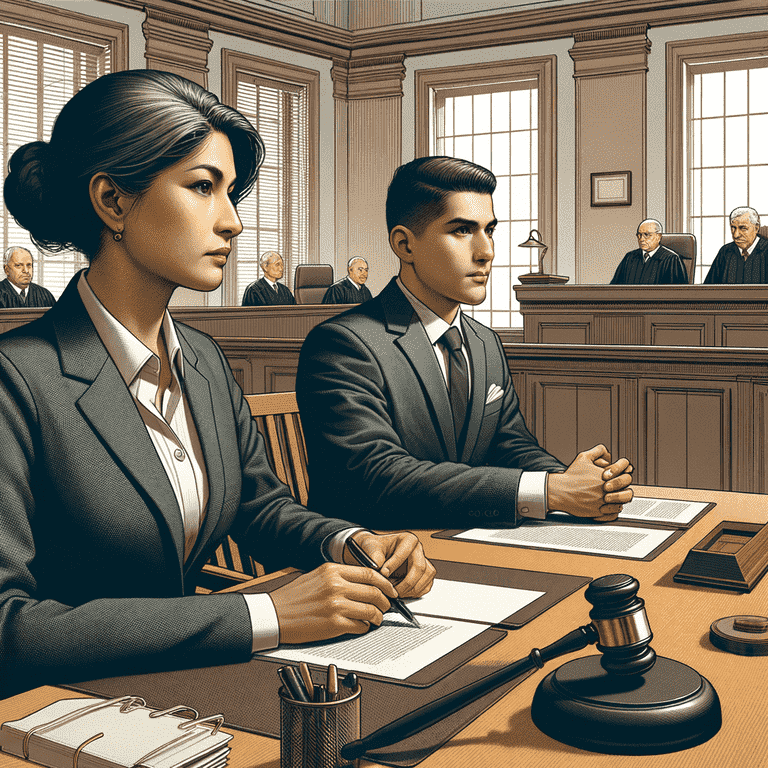Considering a Plea Bargain in Nevada? Here's What You Need to Know
Making the Decision: Plea Bargain Basics
When facing a legal situation, knowing the best course of action can be challenging.
You might have to choose whether to accept a plea bargain. But what is a plea bargain, and when should you consider it?
Let’s break it down.

What is a Plea Bargain?
A plea bargain is an agreement between a defendant (the person who’s been charged with a crime) and the prosecutor (the one trying to prove the defendant did the crime).
In a plea bargain, the defendant agrees to plead guilty or no contest to a crime, often less serious than initially charged or with less severe sentences. In return, the prosecutor agrees to drop some charges or recommend a lighter sentence.
When Should You Consider a Plea Bargain?
Accepting a plea bargain is a personal choice, depending on many factors. Here are a few things you might want to think about:
- The evidence against you: If the evidence is strong, a plea bargain might be a good option to avoid a harsher sentence.
- The potential sentence: If the possible sentence for your crime is severe, a plea bargain might lessen the punishment.
- Your situation: If you want to resolve your case quickly, a plea bargain might be best.
But remember, every case is different, and these are just general considerations.

Understanding the Pros and Cons of a Plea Bargain
Making the right decision about a plea bargain involves understanding its advantages and disadvantages. Let’s dive deeper into these points.
The Benefits of Accepting a Plea Bargain
- Greater Certainty: A plea bargain gives you a better idea of your outcome. Trials can be unpredictable, and a plea bargain can provide some certainty about your sentence.
- Less Time in Court: Trials can take a long time and can be emotionally draining. Accepting a plea bargain can help speed things up.
- Reduced Charges or Sentences: Often, plea bargains involve pleading guilty to a lesser charge, which can result in a lighter sentence.
The Downsides of Accepting a Plea Bargain
- You Must Plead Guilty: You must admit guilt to a crime with a plea bargain. This admission stays on your record and can affect your future.
- Limited Appeals: Once you accept a plea deal and plead guilty, you usually give up your right to appeal.
- Possible Coercion: Sometimes, people feel pushed into accepting a plea bargain out of fear of a worse outcome if they go to trial.
How The Rosenblum Allen Law Firm Can Help
Our defense attorneys at The Rosenblum Allen Law Firm can help you navigate these pros and cons.
We can assess the strength of the case against you and the fairness of the plea offer.
We will explain all the potential impacts of accepting a plea bargain, including on your record and future opportunities. This allows you to decide whether to take a plea bargain or go to trial.
Remember, You're Not Alone
Facing a criminal charge can feel overwhelming, but you don’t have to go through it alone.
A trusted defense attorney can guide you through the process.
They can help you understand your options, advise you on the best course of action, and fight for your rights in court, whether you accept a plea bargain or go to trial.
Your interests and future are our top priority at The Rosenblum Allen Law Firm.
Why You Have Not Hired a Felony Defense Attorney Yet
Watch this short video to take the next big step toward defending your rights against a felony charge.

Breaking It All Down for You
A plea bargain is an agreement where the defendant agrees to plead guilty, often to a lesser charge, in exchange for a lighter sentence or the dismissal of some charges.
Whether to accept a plea bargain in Nevada depends on factors like the strength of evidence against you, potential sentence severity, and your situation.
Plea bargains come with both benefits and downsides. They often lead to greater certainty, less time in court, and reduced charges or sentences. However, they require you to plead guilty, which will go on your record, limit your right to appeal, and sometimes can feel like coercion.
A skilled defense attorney from The Rosenblum Allen Law Firm can help you understand your options, navigate these pros and cons, and make the best decision based on your unique circumstances.
Remember, you are not alone in this process. Legal professionals are here to help guide you through this critical decision.

Frequently Asked Questions
What does “pleading no contest” mean in a plea bargain?
In a plea bargain, you may have the option to plead “no contest” instead of “guilty.” This means you’re not admitting guilt, but you’re not fighting the charges either. The court treats it like a guilty plea, but it might have different implications for any related civil cases.
Can a plea bargain be negotiated or changed once it’s offered?
Yes, plea bargains can often be negotiated. A defense attorney can help negotiate the terms of the plea bargain with the prosecutor. This includes the charges and the recommended sentence.
What happens if I reject a plea bargain?
If you reject a plea bargain, the case will likely proceed to trial, where a judge or jury will determine your guilt or innocence based on the evidence presented. Depending on the outcome, this could result in a higher or lower sentence than what was offered in the plea bargain.
Can I change my mind after accepting a plea bargain?
Once you’ve formally accepted a plea bargain in court, it’s generally difficult to change your mind. However, in some cases, it may be possible to prove that you didn’t fully understand the plea agreement or were coerced into accepting it.
Is a plea bargain public record?
Yes, plea bargains become part of the public record because they are made in court. This means the public can access the details of the plea agreement and the resulting sentence, similar to trial proceedings.
How does a plea bargain affect my criminal record?
A guilty or no contest plea in a plea bargain will appear on your criminal record. This could impact future employment opportunities, housing applications, and more. It’s important to discuss these potential impacts with your defense attorney.
What if I’m innocent but considering a plea bargain?
If you’re innocent but considering a plea bargain to avoid the risk of a trial, it’s crucial to discuss this with your defense attorney. They can help you understand the potential consequences and consider other possible defenses.
Are there different types of plea bargains?
Yes, there are mainly three types of plea bargains: charge bargaining (the defendant pleads guilty to a less serious charge), sentence bargaining (the defendant argues guilty in exchange for a lighter sentence), and fact bargaining (the defendant admits to specific facts in return for others being disregarded).If you’re innocent but considering a plea bargain to avoid the risk of a trial, it’s crucial to discuss this with your defense attorney. They can help you understand the potential consequences and consider other possible defenses.
How does a defense attorney help in the plea bargaining process?
A defense attorney plays a crucial role in the plea bargaining process. They can help assess the strength of the case against you, negotiate the terms of the plea bargain with the prosecutor, explain the potential impacts on your record and future, and ultimately guide you to make the best decision based on your unique situation.

Additional Resources for You
Molly Rosenblum Allen, Esq., our esteemed lead attorney, not only provides exceptional legal representation but also offers a wealth of knowledge through various resources. These resources are designed to assist individuals in understanding complex legal matters and making informed decisions during challenging times. Below is a list of valuable resources created by Molly Rosenblum Allen, Esq., available on our website:
Double Jeopardy: A comprehensive guide explaining the principle of Double Jeopardy and its implications within the legal system.
Hung Jury: Insightful information about what a hung jury means, its consequences, and how it affects the outcome of a trial.
Circumstantial Evidence: An informative piece detailing the role and significance of circumstantial evidence in criminal cases.
Indicted vs Charged: A clear distinction between being indicted and being charged, providing clarity on these two crucial stages in the legal process.
Difference Between Jail and Prison: An explanation of the key differences between jail and prison, two terms commonly misunderstood and interchangeably used.
What are Miranda Rights: A vital resource outlining the importance of Miranda Rights and their role in protecting the rights of individuals during police interrogations.
How to Check if You Have an Outstanding Warrant: Guidance on how to determine if there is an outstanding warrant against you and the steps you should take in such a scenario.
What to Look for in a Criminal Defense Lawyer: Essential tips and criteria to consider when seeking the right criminal defense lawyer for your case.
Possible Ways to Reduce a Felony Charge: Strategies and legal avenues that might be available to reduce the severity of a felony charge.
We encourage our readers to explore these resources to gain a deeper understanding of the legal landscape and to navigate their legal challenges more effectively.

Offsite Resources You May Find Helpful
Here are seven offsite resources that may be of interest to you. They all offer valuable information related to legal matters, particularly those relevant to criminal defense:
American Civil Liberties Union (ACLU): A national organization that provides resources on a broad range of legal issues and civil liberties.
National Association of Criminal Defense Lawyers (NACDL): This organization offers resources for legal professionals and individuals seeking information on criminal defense law.
The Innocence Project: An organization dedicated to exonerating wrongly convicted individuals through the use of DNA testing.
Legal Information Institute (LII) at Cornell Law School: A comprehensive resource for U.S. law and legal issues, including an extensive free law library.
The National Legal Aid & Defender Association (NLADA): NLADA offers resources for those who cannot afford legal counsel and for public defenders.
Federal Bureau of Investigation (FBI): The FBI’s website provides information about federal laws and procedures, as well as resources about different types of crimes.
The United States Department of Justice (DOJ): The DOJ’s website offers information about the U.S. legal system, your rights, and the process of reporting crimes.

A Special Message From Our Lead Attorney

Molly Rosenblum, Esq
Dear Reader,
I appreciate you taking the time to peruse our resources on plea bargaining. Providing these materials is part of our commitment to helping individuals navigate the complexities of the legal system.
Understanding your situation and the options available is crucial in any legal proceeding. It’s our mission to ensure you have access to the essential information needed to make informed decisions about your case.
If you need further assistance or have specific questions regarding your case, I invite you to schedule a free consultation. We’re here to listen, understand your circumstances, and support you during this challenging time.
Please feel free to call us at (702) 433-2889. We’re ready to help guide you through your legal journey.
Thank you once again for considering The Rosenblum Allen Law Firm. We look forward to the opportunity to serve you.
Warm Regards,
Molly Rosenblum, Esq.



